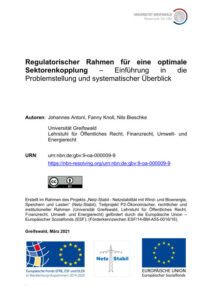
Antoni, Johannes; Knoll, Fanny; Bieschke, Nils
Regulatorischer Rahmen für eine optimale Sektorenkopplung – Einführung in die Problemstellung und systematischer Überblick
Erstellt im Rahmen des Projekts Netz-Stabil. Universität Greifswald.
The Netz-Stabil research association examines how a stable energy supply can be achieved despite fluctuating generation from renewables.

The energy transition on the generation side and the technological change on the consumer side lead to a deterioration of the stability of the interconnected electrical grid. The fluctuating supply of regenerative generators endangers the balance between generated and consumed power. On the consumer side, the increasing use of inverter-fed drives leads to a weakening of the coupling between grid frequency and power consumption and thus to a reduction in grid attenuation. The research project is dedicated to these problems with special regard to Mecklenburg-Western Pomerania.
The research association “Netz-Stabil” (network stability) investigates the important questions for Mecklenburg-Western Pomerania as a state of renewable energies: how can a stable and secure energy supply be achieved on the basis of fluctuating energy generation (wind and solar plants)?
The task of the University of Greifswald under the direction of the Chair of Public Law, Financial Law, Environmental and Energy Law of IKEM Director Prof. Dr. Michael Rodi is to evaluate the identified technical solutions from a legal and economic point of view. On this basis, proposals for the adaptation of the legal and policy framework in the federal government as well as in the state of Mecklenburg-Western Pomerania are to be developed.

Netz-Stabil – Netzstabiltät mit Wind- und Bioenergie, Speichern und Lasten
Principal: Landesamt für Gesundheit und Soziales Mecklenburg-Vorpommern
Project partner: Hochschule Stralsund, Universität Greifswald , Universität Rostock
Duration: 01/2017–03/2021
© Institute for Climate Protection, Energy and Mobility – Law, Economics and Policy e.V.
